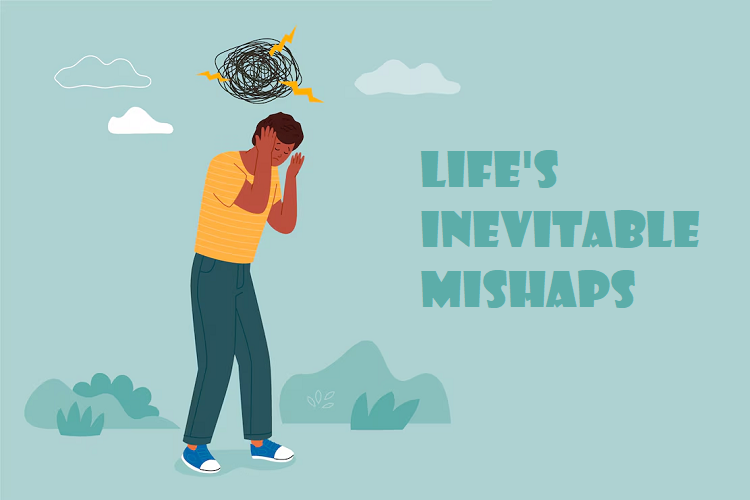Life is unpredictable, but one thing you can guarantee is that inevitable mishaps will happen, often when you least expect them. A sudden illness may impact you or your loved one. A job loss might wreak havoc on your financial security. Or, even more out of your control, a natural disaster might strike your community, making your home uninhabitable. Whatever the inevitable mishaps, there are ways to prepare for whatever curveballs life throws your way.

1. Emergency Savings
Establish a financial safety net by saving some of your income for life’s surprises. Review your budget for your essential expenses like housing, utilities, transportation, and food. Then, multiply this by three or six to get your target savings balance, which is what many experts recommend.
This total will be in the thousands of dollars, so plan to break up your savings goals into reasonable targets. Schedule an automatic transfer on each payday to make progress on your savings goal easy. If you get a bonus, tax refund, or gift money, add it to this account until you reach your goal.
2. Comprehensive Insurance
Insurance is the guardian angel of life’s disasters, coming in to clean up after the wreckage settles. Whether it’s car insurance, health insurance, or homeowners’ this essential coverage ensures you and your essentials are cared for.
Review your current policies to ensure you have the right coverage for your needs, location, and risk potential. If you live in a coastal area, consider hurricane insurance, which covers more than your standard home insurance. For homes with a basement, ensure you have basement backup or sump coverage in the event of flooding. Review your policy details each year, including limits, declarations, and deductibles, which may vary by claim.
3. Disaster Planning
You might think that you’re ready to react at any moment to anything, but have you truly thought it through? Moreover, have you discussed your disaster action plan with your household? While some reactions to stressful situations may come naturally, it’s unlikely that everyone’s default response will be the same.
Consider the most likely situations you and your household might face and draft an action plan. This may be as simple as reviewing what to do if there’s a fire and going over basic do’s and don’ts. Establish a meetup point in your yard or neighborhood, so that if you get separated you have a rallying point. Consider the ages of those you share a home with, adjusting your plan so they can understand. Reiterate the importance of only getting themselves out and not their things and review and practice your plan regularly.
4. Lifelong Learning
If you’re not learning, you may be falling behind. Commit to a growth midwest and thirst for knowledge, no matter your industry. Tap into your employers’ resources to gain a competitive edge and evolve with technology. Everything you learn will add to your marketability and abilities on the job and can expose new opportunities.
When you’re ready to move on from your employer or your role, you’ll have gained new skills that present options. If your employer downsizes and you’re laid off, now you have an edge to help you land a new role. Plus, continuous learners are often more engaged and satisfied, making them more attuned to their careers and potential.
5. Mental Wellness
Resilience is a learned response to adversity, but not everyone comes by this trait easily. Train your mind to handle whatever life throws at it before a major disaster strikes. Engage in therapy, even if you aren’t experiencing a specific concern. Mental health is part of your overall health, and nurturing your mind is essential for handling life’s inevitable mishaps.
Incorporate mindfulness activities into your routine to level set before the day gets away from you. Wake early, meditate, and journal to start your day on your terms. Incorporate movement through yoga, pilates, or walking for a mind-body benefit. By mastering your mind in a calm setting, you can be in a better position to handle the unexpected.
6. Self-Care
Beyond caring for your mental state, you must also care for your body. Some benefits will come from your mindfulness practices, but self-care digs deeper. Consider how fulfilled you are with life and if you’re giving to yourself as much as you are to others.
Many caregivers find themselves busy but don’t make time for the things that pour back into their own cups. What’s meaningful will vary, so take time to consider what would just be for you. For some, this is time to work on a passion project while others enjoy pampering themselves to reset. Prioritize self-care practices to ensure you’re in the best mental state to manage stressful situations when they arise.
7. Healthy Relationships
Relationship dynamics shift over time, so evolving your expectations and interaction with others is important to your overall well-being. Nurture your friendships, family dynamics, and romantic relationships with care and consideration for each phase of life. As you grow older, people get busier. You may need to update your Sunday brunch routine to a weekly group video chat.
Take time to connect in ways that flex with your current phase of life, which can reduce stress and decrease feelings of loneliness. Those you are close to will be there for you when life gets challenging and often provide insight that only a close friend can. Prioritize your romantic relationships, too, which can improve feelings of connection and trust. If and when a disaster arises, you’ll be on the same page, and team, for whatever comes your way.
Bounce Back From Adversity With a Plan
With careful preparation, you can bounce back from life’s inevitable mishaps may bring. Be proactive in planning for the possibilities that your life, lifestyle, and location make possible. Protect what’s yours with insurance, savings, and diversified income while building resilience within yourself by caring for your mental health. With these things combined, you can overcome any obstacle and recover from adversity.



